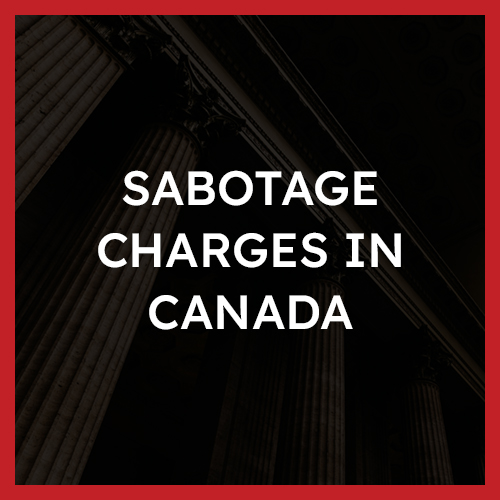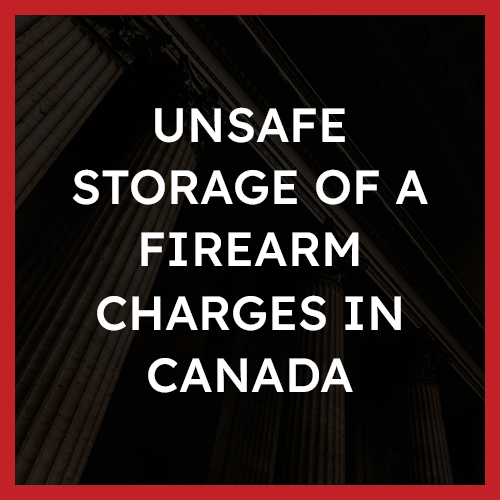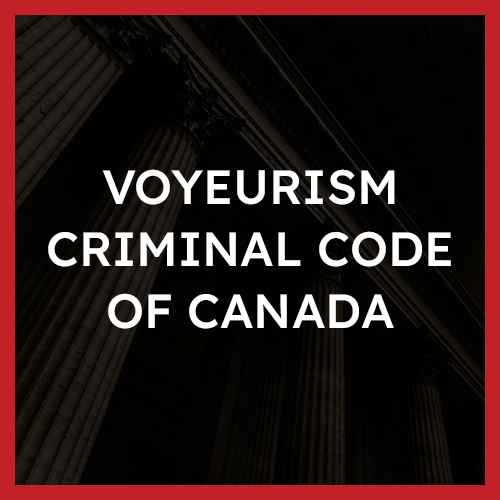Sabotage Laws in Canada
What is a charge of Sabotage?

Sabotage is a hybrid offence with a Crown election. This means that depending on the circumstances of your case the Crown can elect to proceed by indictment or summarily. If an accused is prosecuted by indictment, there is a Defence election of court under s. 536(2) of the Criminal Code.
Examples
Some examples of a charge of Sabotage may include the following:
- The accused was arrested after tampering with `the computer system of a naval submarine used by the armed forces, causing it to be inoperable
- The accused damages the mechanics of an aircraft used by the Royal Canadian Air Force
- The accused was given confidential information and publicized it with the intention of obstructing and impeding a military operation; and
- The accused destroys documents that are required for a military operation; therefore obstructing the military’s ability to complete the mission.
Defences
The defences available to a charge of Sabtoage are entirely dependent on the facts of your case.
However, some defences to a charge of Sabotage may include:
- The accused was wrongly identified as the person who committed sabotage
- The accused was not aware that the damage caused to equipment was property of the military or would compromise operations
- The accused mistakenly released information he or she did not know was confidential
Punishment
A charge of Sabotage is a hybrid offence, which entails a maximum punishment as follows:
- Imprisonment for a term not exceeding 10 years.
Punishments for Sabotage depend on if the Crown elects to pursue the charge as an indictable offence or summarily. There are no mandatory minimum penalties for this offence. The maximum is no more than 10 years of incarceration if prosecuted by indictment. If prosecuted summarily, there is no minimum penalty.
A charge of Sabotage can also entail severe consequences for current and future employment opportunities.
Overview of the Offence
According to s. 52(1) of the Criminal Code:
52 (1) Every person is guilty of an indictable offence and liable to imprisonment for a term of not more than 10 years or is guilty of an offence punishable on summary conviction who does a prohibited act for a purpose prejudicial to
(a) the safety, security or defence of Canada, or
(b) the safety or security of the naval, army or air forces of any state other than Canada that are lawfully present in Canada.
The punishment for Sabotage is:
- An indictable offence and liable to imprisonment for a term of not more than 10 years; or
- An offence punishable on summary conviction.
The Guilty Act (Actus Reus)
The actus reus for a charge of sabotage under s. 52(1) is established by proof, beyond a reasonable doubt, of the following:
- The accused at a specified date and time, in the correct jurisdiction, committed a prohibited act, which caused property to be lost, destroyed or damaged, or impaired or impeded the efficiency or effectiveness of a vessel, aircraft, or machinery
- the accused, knowing that their actions were a prohibited act, did so with the intention of committing a prohibited act.
The Guilty Mind (Mens Rea)
The mens rea for a charge of sabotage under s. 52(1) include proving, beyond a reasonable doubt, that:
- The accused, knowing that their actions were a prohibited act, did so with the intention of committing a prohibited act (as defined in section 52(3) of the criminal code of Canada).
Defences
How to Beat a Sabotage Charge
Every case is different. The availability and strength of any defence depend entirely on the specific facts of your case. The strength of any available defence rests on the evidence against you and the precise details of the allegations. However, the following are some common defences that may be used when fighting a Sabotage charge:
Factual innocence
A strong defence against a Sabotage charge is to maintain that you are factually innocent. If you can show that the facts and the evidence do not support that you damaged military equipment, you were not aware the equipment belonged to the military, or that you were not involved whatsoever. Then you may have a defence that you were factually innocent.
Lack of Intent/Mistake
If you can show that you were never aware of the property which may have been damaged as that of the Canadian forces or required for national defence, then this can be a defence for sabotage. For you to be convicted of sabotage, the crown must prove that you had knowledge that your actions would obstruct or impede Canada’s national defence. If this cannot be proved this could be a suitable defence.
Identity
Depending on the circumstances of your case, a possible defence to a sabotage charge may be to raise an identity defence. In this case, for this defence to be raised successfully, you will have to prove that you were not the person who committed the prohibited acts.
Any applicable Charter defences
The Charter sets out your rights and freedoms before and after your arrest. If the police fail to abide by these rights deliberately or inadvertently, it could aid in your defence. If any of your Charter rights have been violated before or after your arrest, you may be able to have some or all of the evidence that the Crown is relying on to secure a conviction excluded under s. 24(2) of the Charter.
Punishments
The Criminal Code provides for a possible maximum term of imprisonment of no more than 10 years for those convicted of a Sabotage charge.
Persons found guilty of sabotage are eligible for sentencing entailing a discharge, suspended sentence, stand-alone fine, custody
Frequently Asked Questions
What does Sabotage mean?
Sabotage is a very serious matter. It is any prohibited act that could harm the safety, security, or defence of Canada. It is any act that threatens the country’s naval, army, or air forces, or any country’s military that is lawfully operating in Canada. To be convicted of Sabotage, the Crown prosecutor must prove that your actions constituted a prohibited act that was prejudicial to the safety of Canada or national military units legally operating within our borders. A prohibited act that is essential for any charge of sabotage refers to an act or an omission that: impairs the efficiency or impedes the working of any vessel, vehicle, aircraft, machinery, or another type of apparatus or causes property to be lost, damaged or destroyed.
Is sabotage an indictable offence?
Sabotage is a hybrid offence. This means that the Crown prosecutor can choose to prosecute someone charged with Sabotage either summarily or by indictment. If the Crown chooses to prosecute an accused by indictment, then if the accused is found guilty, they will be charged with an indictable offence.
Can you go to jail for Sabotage?
If you are convicted of sabotage, you can go to jail. If the Crown proceeds by indictment, a charge of sabotage carries a maximum sentence of no more than ten years in jail. If the Crown proceeds summarily, the maximum jail sentence is two years less a day. Therefore, there is a possibility that you can go to jail for a sabotage charge.
Published Decisions
R. v. Reid, 2010 CMAC 4 (CanLII), 7 CMAR 448
A member of the Canadian Armed Forces (CAF) plead guilty to a lesser charge of mischief under the National Defence Act, resulting in the withdrawal of the initial charges which included sabotage. The accused, frustrated with employment matters while deployed at the National Defence Headquarters, conspired with another employee to “crash” the informational electronic database, in order to cause havoc and force other employees to deal with the issue. The damage was later determined by a damage assessment report to have no significant impact on operations or mission effectiveness.
You can read the full decision here.
Control of Apprehended Insurrection: Emergency Measures vs. the Criminal Code, 1971 CanLIIDocs 15
This article in the Manitoba Law Journal discusses the inherent difference between emergency measures and the criminal code charge of Sabotage.
You can read the full article here.
Freedom of the Press and National Security, 1975 CanLIIDocs 109
This commentary by Brian Crane outlines how “offences against public order” in the Criminal Code which include sabotage and sedition, confirm that the mere communication of confidential information to unauthorized persons is not an offence (whistleblowing). However, treason and breach of trust may ultimately apply.
You can read the full article here.
Contact Us
If you have been charged with a criminal offence, visit our location pages to contact our team.
About The Author
Ask A Question
We endeavor to respond to questions within 24 hours. If your matter is urgent, please call our office or submit a request for a free consultation.







